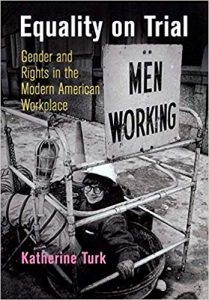
Cover of Equality on Trial by Katherine Turk
In 1964, Title VII of the Civil Rights Act, prohibited sex discrimination in employment. While this law did not clearly define sex discrimination, or how to cure it, it set a foundation of the working woman’s fight for equality. In the following decades, Title VII revolutionized women’s status in the American workplace (2). In her book Equality on Trial, Katherine Turk explores how Title VII served simultaneously as an inspiration and detriment to progressive visions of workplace gender equality. She examines how numerous groups such as workplace caucuses, feminist organizations, and unions, use this law to, “reset the terms of economic citizenship from laboring women’s perspective” (9). Turk’s work fits in nicely with Edelman’s article “Unions on the Line: Myth vs. Reality”, as well as Johnnie Tillmon’s essay “Welfare is a Women’s Issue”, both works that were made possible after the discussion and controversy that different interpretations of Title VII inspired.
Turk, Katherine. Equality on Trial: Gender and Rights in the Modern American Workplace. University of Pennsylvania Press, 2016. JSTOR, www.jstor.org/stable/j.ctt1btc5x9.
